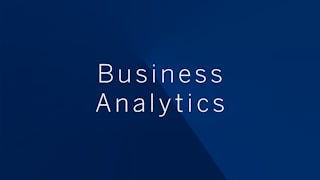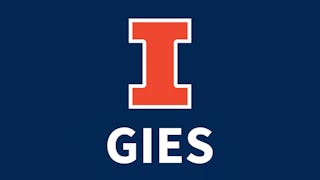Businesses run on data, and data offers little value without analytics. The ability to process data to make predictions about the behavior of individuals or markets, to diagnose systems or situations, or to prescribe actions for people or processes drives business today. Increasingly many businesses are striving to become “data-driven”, proactively relying more on cold hard information and sophisticated algorithms than upon the gut instinct or slow reactions of humans.

Enjoy unlimited growth with a year of Coursera Plus for $199 (regularly $399). Save now.

Business Analytics Executive Overview
This course is part of Introduction to Business Analytics and Information Economics Specialization

Instructor: Douglas B. Laney
19,204 already enrolled
Included with
(282 reviews)
What you'll learn
Understand key analytics concepts, types of technologies, and related roles.
Identify key components of real-world analytics solutions in various industries and business functions.
Conceive new ways to leverage or adapt existing analytics methods to business problems.
Know what makes an analytics project successful, and be aware of key analytics trends.
Skills you'll gain
Details to know

Add to your LinkedIn profile
5 assignments
See how employees at top companies are mastering in-demand skills

Build your subject-matter expertise
- Learn new concepts from industry experts
- Gain a foundational understanding of a subject or tool
- Develop job-relevant skills with hands-on projects
- Earn a shareable career certificate

There are 4 modules in this course
This first module exposes and explains key data and analytics concepts from Big Data to data warehousing to natural language query, and everything in-between. Next we will explore various analytic techniques, types of visualizations, and types of analytics solutions. The course will continue with identifying and learning about key data and analytics roles and organization structures, including chief data and analytics officers, data scientists, and analytics centers of excellence. Alternatives to direct hiring, such as outsourcing and crowdsourcing, will also be covered. Finally, the course will scrutinize analytic trends and futures.
What's included
18 videos9 readings2 assignments
Over the course of the module, you will also see how data and analytics in each of these organizations can be used in similar ways, in similar business functions. Accordingly, you will appreciate that to be truly data-driven, you need not only look to examples in your own industry, but, also learn and apply analytics concepts from organizations in other fields.
What's included
11 videos2 readings1 assignment
In this module you will learn a bunch of crucial analytical roles and the emergence of new roles in organizations from the C-suite down to various analyst roles. You will take a brief look at the job descriptions and the responsibilities. You will also put yourself in either a job seeker’s or a recruiter’s shoes to see what kind of skill sets are the most important and which position fits you the best. For example, it will introduce you to the three core skills of the data scientist and the crucial soft skills required to be a successful data scientist.
What's included
11 videos2 readings1 assignment1 peer review
This module explores telling stories, through data, that connect emotionally with your audience. It will also review examples and figures that make the concept easy to understand. You will learn the major do’s and don’ts of creating dataviz and rules that lead to the clear depiction of your findings. This unit specifically focuses on Dona Wong’s guidelines for good data visualization and charts. The last leg of Module 4 teaches the three tests that help you improve your visualization. In the final step of dataviz execution, you will learn the McCandless Method for presenting visualizations. This five-step process produces the most effective communication of the graphics to your audience.
What's included
14 videos4 readings1 assignment1 plugin
Earn a career certificate
Add this credential to your LinkedIn profile, resume, or CV. Share it on social media and in your performance review.
Prepare for a degree
Taking this course by University of Illinois Urbana-Champaign may provide you with a preview of the topics, materials and instructors in a related degree program which can help you decide if the topic or university is right for you.
Instructor

Offered by
Explore more from Leadership and Management
 Status: Preview
Status: PreviewCampus BBVA
 Status: Free Trial
Status: Free TrialUniversity of Illinois Urbana-Champaign
 Status: Free Trial
Status: Free TrialUniversity of Illinois Urbana-Champaign
 Status: Free Trial
Status: Free TrialUniversity of Colorado Boulder
Why people choose Coursera for their career




Learner reviews
282 reviews
- 5 stars
71.63%
- 4 stars
21.27%
- 3 stars
4.96%
- 2 stars
0.70%
- 1 star
1.41%
Showing 3 of 282
Reviewed on May 15, 2020
knowledgeable and a lot of insight towards the role of analytics in the business world and in a nations economy and its different elements.
Reviewed on Aug 8, 2019
Excellent course, very practical and gives students new ideas by highlighting what other companies are doing.
Reviewed on Jun 25, 2022
Liked everything except the peer-reviewed assignment. Four reviews is too many. It took several weeks to get submissions to review after I had finished everthing else.
Frequently asked questions
Once you enroll for a Certificate, you’ll have access to all videos, quizzes, and programming assignments (if applicable). If you choose to explore the course without purchasing, you may not be able to access certain assignments.
You will be eligible for a full refund until 2 weeks after your payment date. You cannot receive a refund once you’ve earned a Course Certificate, even if you complete the course within the 2-week refund period. View our full refund policy.
Yes! Coursera provides financial aid to learners who would like to complete a course but cannot afford the course fee. To apply for aid, select "Learn more and apply" in the Financial Aid section below the "Enroll" button. You'll be prompted to complete a simple application; no other paperwork is required.
More questions
Financial aid available,





